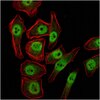ABC1691 Sigma-AldrichAnti-PEPCK
Detect Phosphoenolpyruvate carboxykinase, cytosolic [GTP] using this rabbit polyclonal Anti-PEPCK, Cat. No. ABC1691, tested in Immunohistochemistry (Paraffin) and Western Blotting.
More>> Detect Phosphoenolpyruvate carboxykinase, cytosolic [GTP] using this rabbit polyclonal Anti-PEPCK, Cat. No. ABC1691, tested in Immunohistochemistry (Paraffin) and Western Blotting. Less<<Anti-PEPCK MSDS (material safety data sheet) or SDS, CoA and CoQ, dossiers, brochures and other available documents.
Recommended Products
概述
| Replacement Information |
|---|
重要规格表
| Species Reactivity | Key Applications | Host | Format | Antibody Type |
|---|---|---|---|---|
| H | WB, IH(P) | Rb | Affinity Purified | Polyclonal Antibody |
| References |
|---|
| Product Information | |
|---|---|
| Format | Affinity Purified |
| Presentation | Purified rabbit polyclonal antibody in buffer containing 0.1 M Tris-Glycine (pH 7.4), 150 mM NaCl with 0.05% sodium azide. |
| Quality Level | MQ100 |
| Physicochemical Information |
|---|
| Dimensions |
|---|
| Materials Information |
|---|
| Toxicological Information |
|---|
| Safety Information according to GHS |
|---|
| Safety Information |
|---|
| Storage and Shipping Information | |
|---|---|
| Storage Conditions | Stable for 1 year at 2-8°C from date of receipt. |
| Packaging Information | |
|---|---|
| Material Size | 100 μg |
| Transport Information |
|---|
| Supplemental Information |
|---|
| Specifications |
|---|
| Global Trade Item Number | |
|---|---|
| 产品目录编号 | GTIN |
| ABC1691 | 04054839189128 |
Documentation
Anti-PEPCK MSDS
| 职位 |
|---|
Anti-PEPCK 分析证书
| 标题 | 批号 |
|---|---|
| Anti-PEPCK - 3558933 | 3558933 |
| Anti-PEPCK Polyclonal Antibody | Q2831713 |










 Antibody[227924-ALL].jpg)






